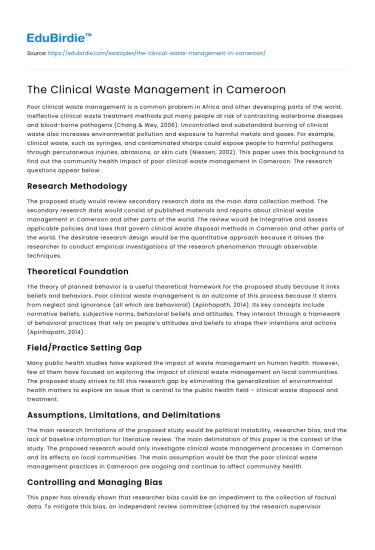Poor clinical waste management is a common problem in Africa and other developing parts of the world. Ineffective clinical waste treatment methods put many people at risk of contracting waterborne diseases and blood-borne pathogens (Chang & Wey, 2006). Uncontrolled and substandard burning of clinical waste also increases environmental pollution and exposure to harmful metals and gases. For example, clinical waste, such as syringes, and contaminated sharps could expose people to harmful pathogens through percutaneous injuries, abrasions, or skin cuts (Niessen, 2002). This paper uses this background to find out the community health impact of poor clinical waste management in Cameroon. The research questions appear below:
Research Methodology
The proposed study would review secondary research data as the main data collection method. The secondary research data would consist of published materials and reports about clinical waste management in Cameroon and other parts of the world. The review would be integrative and assess applicable policies and laws that govern clinical waste disposal methods in Cameroon and other parts of the world. The desirable research design would be the quantitative approach because it allows the researcher to conduct empirical investigations of the research phenomenon through observable techniques.
Save your time!
We can take care of your essay
- Proper editing and formatting
- Free revision, title page, and bibliography
- Flexible prices and money-back guarantee
Theoretical Foundation
The theory of planned behavior is a useful theoretical framework for the proposed study because it links beliefs and behaviors. Poor clinical waste management is an outcome of this process because it stems from neglect and ignorance (all which are behavioral) (Apinhapath, 2014). Its key concepts include normative beliefs, subjective norms, behavioral beliefs and attitudes. They interact through a framework of behavioral practices that rely on people’s attitudes and beliefs to shape their intentions and actions (Apinhapath, 2014).
Field/Practice Setting Gap
Many public health studies have explored the impact of waste management on human health. However, few of them have focused on exploring the impact of clinical waste management on local communities. The proposed study strives to fill this research gap by eliminating the generalization of environmental health matters to explore an issue that is central to the public health field – clinical waste disposal and treatment.
Assumptions, Limitations, and Delimitations
The main research limitations of the proposed study would be political instability, researcher bias, and the lack of baseline information for literature review. The main delimitation of this paper is the context of the study. The proposed research would only investigate clinical waste management processes in Cameroon and its effects on local communities. The main assumption would be that the poor clinical waste management practices in Cameroon are ongoing and continue to affect community health.
Controlling and Managing Bias
This paper has already shown that researcher bias could be an impediment to the collection of factual data. To mitigate this bias, an independent review committee (chaired by the research supervisor) would review the research process and findings.
Hasty generalization is one logical fallacy that may emerge in the proposed study. This fallacy occurs when researchers infer findings using inadequate data. This discrepancy may occur because Cameroon is a big country and it may be difficult to obtain sufficient data that would describe clinical waste management systems in the entire country. However, to guard against this fallacy, it would be important to get a big sample that is (at least) representative of all regions of the country.
Literature Synthesis
Some public health studies have explored the impact of clinical waste on local communities. However, few of them have focused on Africa and the challenges that public health workers experience in this region. Three articles are of special interest to this paper because they explore different aspects of the topic. Patil and Shekdar (2001), Niessen (2002), and Chang and Wey (2006) have written them. Patil and Shekdar (2001) discuss segregation, temporal storage, and transportation of clinical waste, while Niessen (2002) discusses treatment and disposal technologies for treating clinical waste. Lastly, Chang and Wey (2006) discuss the by-products of clinical waste incineration (bottom ash, inorganic releases, organic releases, and gaseous emissions).
Implications for Future Research
Since the proposed study would focus on understanding poor clinical waste management systems in Cameroon, its findings would be useful to researchers who may want to explore new ways of lowering the disease burden arising from poor waste management. The findings of this paper would also help future researchers to seek better ways of improving state monitoring systems of policy implementation in clinical waste management.
Contributions to Discipline and Social Change
Improper handling and disposal of waste has always increased mortality and morbidity in many developing countries (Chang & Wey, 2006). Human and ecosystem health also suffers, in this regard, through poor waste management systems and neglect by health authorities to take precaution when handling clinical waste. The findings of the proposed paper would be useful to public health officials in developing a framework for sustainable clinical waste management.






 Stuck on your essay?
Stuck on your essay?

